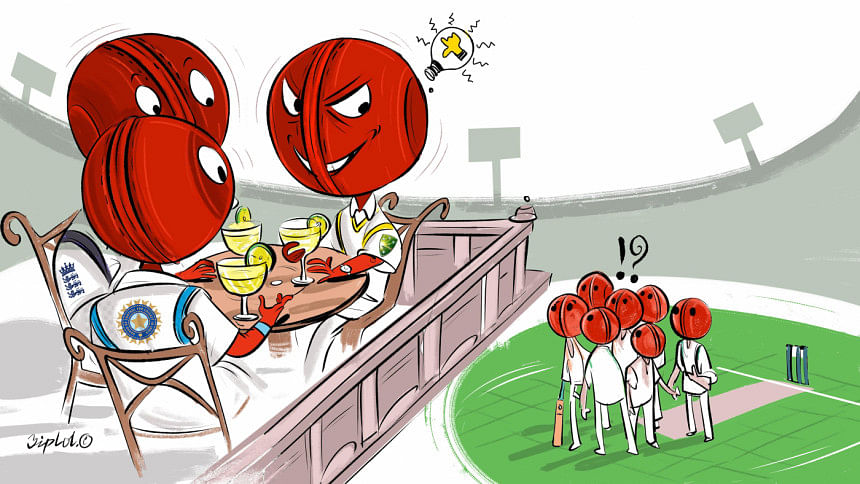Two-tier Tests: Revival or setback?

The International Cricket Council (ICC) had shelved the two-tier system in Tests in 2016, but arguments in its favour have been gathering steam of late.
During the recently concluded Border-Gavaskar Trophy, Ravi Shastri and Mark Taylor voiced in favour of the two-tier system, due to the enormous crowds and broadcast audiences making the series between the "two best teams" reportedly the most-watched Test series.
Test cricket, far from needing a revival through the two-tier system, has hardly ever been more exciting. There were just two drawn Tests last year, and West Indies have beaten Australia in Australia, while Bangladesh have swept series against Pakistan in Pakistan. However, both West Indies and Bangladesh are likely to be placed in tier two if the system is implemented after the 2025–2027 World Test Championship (WTC) cycle.
"I think it will be terrible for all those countries who worked so hard to get the Test status. Now they'll be playing among themselves in the lower section. How are they going to make it to the top? When you play against better teams. We were the cash cows for a lot of countries over the years ... people must recognise that. But we are at that situation now where we need the help, and we can't get it."
How does the exclusion of certain countries from playing the top nations help with the expansion of cricket or Test cricket? Ideally, it serves fewer games in the calendar for Tests but opens slots for shorter-version formats.
In 2016, Bangladesh Cricket Board had BCCI and others on their side when opposing the two-tier system.
"During former BCB president Nazmul Hassan Papon's first tenure, I was the first one to object to the two-tier proposal in a board meeting, when most of my colleagues were in favour of it," former BCB director Sajjadul Alam said.
"I've said this before, and I'm saying this again, that this will completely destroy our cricket, because we will lose our ground for development. If we can't play against big teams, the interest from our sponsors, fans, and media will gradually fade away. As a result, we will end up depending on ICC's development fund."
Back in 2016, Sajjadul had fellow director Tanjil Chowdhury by his side. "This time it's more serious," Tanjil echoed Sajjadul's sentiments.
"This is counterproductive if you want to make cricket inclusive, because if you see recent times, the notion that Test cricket is dying is being broken," the former BCB director argued.
Asked how will competitiveness between nations come through if the lower-tier teams don't play in Australia or England, Tanjil responded, "Even after you have climbed from the lower tier, you [smaller teams] will be dominated by teams when you make the upper tier because you don't have the experience.
"I've said this before, and I'm saying this again, that this will completely destroy our cricket, because we will lose our ground for development. If we can't play against big teams, the interest from our sponsors, fans, and media will gradually fade away. As a result, we will end up depending on ICC's development fund."
"We are going back to square one, and I don't see anything but the spirit of revenue at play. If you talk about revenue from attendance, then maybe India and Australia are able to generate," Tanjil said.
"The cricket calendar year is dominated by shorter formats, so if you make WTC a two-tier thing, where will competitiveness come? You see that India, Australia, or England are generating most revenue because their TV and media rights are most expensive, but it's not creating a democratic process geared towards cricket's development," he added.
Tanjil has specific remedies he feels could factor in to help stave off a two-tier system. For instance, he argues about a league system where Tests are played in neutral venues.
"Bangladesh and West Indies playing in England can help both boards earn revenue… More Pink Tests could be on the cards to match TV prime time. We can exhaust options before thinking of a two-tier system," he added.
"This is counterproductive if you want to make cricket inclusive, because if you see recent times, the notion that Test cricket is dying is being broken."
Even under the existing WTC system, Bangladesh have not played Tests in Australia so far. Even without a two-tier system, in reality, a two-tier system was sort of in place, and it will find a structure if ICC takes the decision.
One source claimed that BCCI had put in a lucrative offer to BCB during the previous regime to be on their side in return for some revenue as "development cost". Such instances already put the two-tier system within reach.
Former BCB director Sajjadul remarked on the matter, "I have thus one request to the ones in the board, that they should do whatever it takes to prevent this two-tier system from being a reality; otherwise, our survival will be threatened. Also, it's crucial that we do not give in to the financial impetus to be in favour of two-tier system."

 For all latest news, follow The Daily Star's Google News channel.
For all latest news, follow The Daily Star's Google News channel. 









Comments